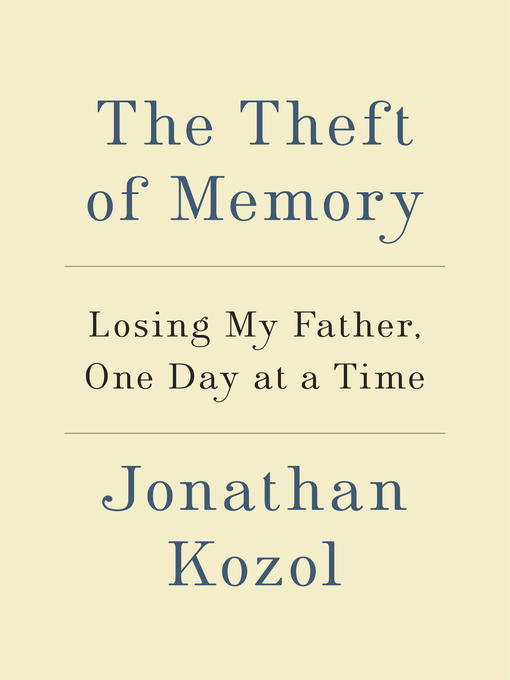
The Theft of Memory
Losing My Father, One Day at a Time
از دست دادن پدر من، یک روز در یک زمان
کتاب های مرتبط
- اطلاعات
- نقد و بررسی
- دیدگاه کاربران
نقد و بررسی

Starred review from April 13, 2015
Kozol (Savage Inequalities), a celebrated crusader for a balanced public school education, shifts his gaze to old age and the heartbreaking but strangely consoling decline of his parents in this luminous memoir. Kozol recounts the last years of his father, Harry, when Alzheimer’s robbed him of his wits but not entirely of his personality. During this period, Kozol got to know his parents better than ever, despite their diminished capacities. Much of the book is an absorbing retrospective of Harry’s career as a neuropsychiatrist, including his work with playwright Eugene O’Neill, heiress-turned-revolutionary Patricia Hearst, and suspected “Boston Strangler” Albert DeSalvo. Mainly, though, it’s about Kozol coping with Harry’s growing helplessness as his mind dims: helping him complete his thoughts, deciphering the incoherent medical memos he issues, and arranging for companions, pets, and small pleasures that give his father’s existence meaning. Kozol’s frail but strong-willed mother Ruth is also a commanding presence in the book. The author’s approach is shrewd yet warmly empathetic; he is curious about how the mind’s gradual breakdown exposes its machinery, and raptly attuned to the emotional effects of these changes on his parents and himself. The result is a clear-eyed and deeply felt meditation on the aspects of family that age does not ravage.

Starred review from April 1, 2015
An errant son memorializes the devastating impact of his father's struggle with Alzheimer's disease. Acclaimed for his work with inner-city schoolchildren, National Book Award winner Kozol's (Fire in the Ashes: Twenty-Five Years Among the Poorest Children in America, 2012, etc.) memoir centers around the subsequent fallout of his father's Alzheimer's diagnosis at age 88 in 1994. A former Boston-area neurologist with an instructional practice at a Harvard teaching hospital, Dr. Harry Kozol began experiencing memory lapses, "interrupted consciousness," and confused wandering spells, which he self-diagnosed as progressive brain cortex cell degeneration. The author dutifully retraces his familial ancestry and writes frankly of an all-consuming rebelliousness that estranged him from his father for a time during the 1960s. Later, Kozol's prolific literary endeavors kept the family distanced further, a situation the author has come to palpably regret in hindsight. While his father's increasing physical frailty and mental fragmentation eventually forced him into a nursing home, the event, however tragic, provided both men ample time to bond and make up for time lost. A poignant consideration of precious memories, the memoir is also accented by Kozol's newfound respect for his father's former sense of "dignity and intellectual engagement" throughout his life, as well as in his profession, an occupation often complicated by the great mental complexities of his patients. As his father's recognition skills and physical agility faltered further, Kozol fully realized the exhaustive challenge of caretaking for a parent. As a reading experience, the entire ordeal only becomes wearying when Kozol's mother also begins exhibiting symptoms akin to his father's rapidly deteriorating lucidity. Readers familiar with the emotional toll exacted by a loved one with Alzheimer's will embrace Kozol's nostalgic, often heart-wrenching narrative as an important addition to the genre. A compassionate, cathartic, and searingly intimate chronicle of a crippling condition.

Starred review from May 1, 2015
National Book Awardwinner Kozol (Fire in the Ashes, 2012), known for his inquiries into public education and the lives of children, movingly turns his attention from the young to the old, specifically, his own father. A brilliant neuropsychiatrist, Harry Kozol trained at Harvard and Johns Hopkins and became a professor. In fact, one of his former students formally diagnosed him with Alzheimer's when he was 88. (Three years earlier, he was getting lost on nighttime walks in Boston's Copley Square.) The playwright Eugene O'Neill, who suffered from depression and a neurological disorder, played a supporting role in Kozol's story; later in his life, O'Neill even moved across the street from Harry Kozol so he could talk with him almost every day. Working from his father's notes, Jonathan Kozol reveals that O'Neill felt at peace only when writing. When the playwright wanted his then-wife, Carlotta, he might yell, Where's my whore? She once answered, You lousy bastard. Where would you be today if it wasn't for this whore? In the gutter! Kozol started this memoir in September 2008, a month after his father died, and finished it the following summer. In the epilogue he added this year, he touches more on aspects of his father's struggles. Overall, a beautifully written love letter.(Reprinted with permission of Booklist, copyright 2015, American Library Association.)

January 1, 2015
A National Book Award winner for Death at an Early Age, Kozol here writes about his father, Dr. Harry L. Kozol, a distinguished neurologist who contributed significantly to the emerging fields of forensic psychiatry and neuropsychiatry. He helped Eugene O'Neill in his final days and served as a forensic expert at the trials of the Boston Strangler and Patty Hearst.
Copyright 2015 Library Journal, LLC Used with permission.

























دیدگاه کاربران